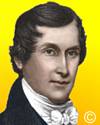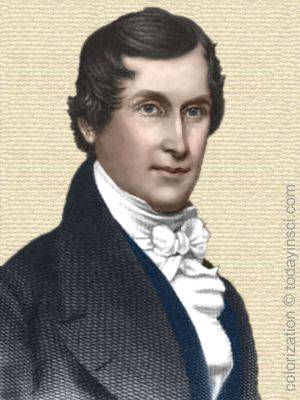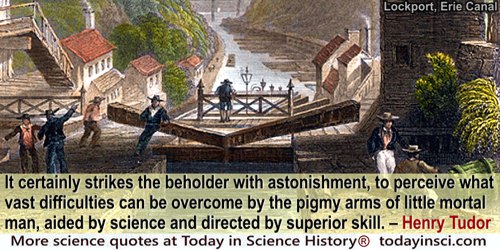 (source)
(source)
|
Canvass White
(8 Sep 1790 - 18 Dec 1834)
American civil engineer , known for his work in building canals, and who patented the first process for making hydraulic cement in the United States.
|
Science Quotes by Canvass White (4 quotes)
The sand should be neither coarse nor fine but of a middling quality or about the size of the common pop[p]y seed. If the sand is too coarse the mortar will be short or brittle … If the sand is too fine the cement will shrink and crack after it has been used.
— Canvass White
Directions for Using White's Patent Hydraulic Cement.
The valuable properties of this cement depend in a great measure on the mode of preparing it for use. The mixing should therefore be conducted with care in order to form a perfect union of the powdered cement, sand and water. This can be best accomplished by the use of the New England corn hoe on a board floor or by beating with a hand stamper; not much labour is required if properly applied. Mechanics can judge when the mixture is perfect by the appearance of the mortar, which, when properly prepared, very much resembles putty.
— Canvass White
Directions for Using White's Patent Hydraulic Cement.
This cement can be used in any situation and for any purpose to which any other mortar or hydraulic cement can be applied. It does not become perfectly hard within one or two months.
— Canvass White
Directions for Using White's Patent Hydraulic Cement.
To every bushel of the powdered cement add one bushel of sand, mix them together and pass them through a sieve, then add a sufficient quantity of water to make it (by well mixing and working) about the consistency of a soft putty. It is then fit to use but should not be kept more than six or eight hours and should be thoroughly worked just before it is used.
— Canvass White
Directions for Using White's Patent Hydraulic Cement.
Quotes by others about Canvass White (1)
It certainly strikes the beholder with astonishment, to perceive what vast difficulties can be overcome by the pigmy arms of little mortal man, aided by science and directed by superior skill.
About his visit to Lockport on the Erie Canal, in Letter IX, to a friend in England from Lockport, New York (25 Jul 1831), collected in Narrative of a Tour in North America (1834), Vol. 1, 233-234,
See also:
- 8 Sep - short biography, births, deaths and events on date of White's birth.
- Canvass White Obituary - from The History of Cohoes, N.Y. (1877).
- The Discovery of Hydraulic Cement - from Gazetteer and Business Directory of Madison County, N.Y. (1868).
- Canvass White: Civil Engineer - from Lives and Works of Civil and Military Engineers of America (1871)
- Great Engineers and Pioneers in Technology, Vol. 1, by Roland Turner and Steven L. Goulden (eds.). - book suggestion.


 In science it often happens that scientists say, 'You know that's a really good argument; my position is mistaken,' and then they would actually change their minds and you never hear that old view from them again. They really do it. It doesn't happen as often as it should, because scientists are human and change is sometimes painful. But it happens every day. I cannot recall the last time something like that happened in politics or religion.
(1987) --
In science it often happens that scientists say, 'You know that's a really good argument; my position is mistaken,' and then they would actually change their minds and you never hear that old view from them again. They really do it. It doesn't happen as often as it should, because scientists are human and change is sometimes painful. But it happens every day. I cannot recall the last time something like that happened in politics or religion.
(1987) -- 


